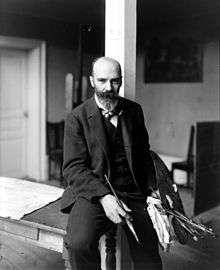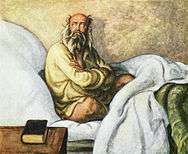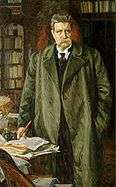Richard Bergh
| Richard Bergh | |
|---|---|
 Richard Berg, photograph from 1904 | |
| Born |
Sven Richard Bergh 28 December 1858 Stockholm, Sweden |
| Died |
29 January 1919 (aged 60) Stockholm, Sweden |
| Nationality | Swedish |
| Education | Royal Swedish Academy of Arts, Stockholm |
| Known for | Portrait painter, landscape painter |
Sven Richard Bergh[1] (28 December 1858 – 29 January 1919) was a well-known Swedish painter from Stockholm, Sweden. His paintings often depicted Swedish landscapes and portraits.[2] In 1915, Bergh became the director of the Swedish National Museum.
Career
After studying at the Royal Swedish Academy of Arts in Stockholm, Bergh traveled to France where he frequently visited the artist colony in Grez-sur-Loing.[3] Bergh took an interest in psychology and incorporated it into his art, as evident by his painting Hypnotic Seance "with its evocation of the widespread contemporary interest in suggestion and hysteria."[3] He had soon established himself as a portrait painter in Sweden, although his landscape paintings played an important role in the development of Swedish romantic nationalism.[3] Bergh produced several landscape paintings in Varberg from 1893 to 1896.[3] His father had also been a landscape painter.[3]
Bergh's portraits of his friends have become his most enduring paintings. One of them, Nordic Summer Evening (1889–1900), is his most frequently reproduced painting. During his career, Bergh painted portraits for Ellen Key, August Strindberg, Gustaf Fröding, Hjalmar Branting, and others.[3] His 1905 portrait of Strindberg, Porträtt av August Strindberg, is one of his most famous paintings;[4][5][6] Bergh described Strindberg as "the most interesting model I have ever had. I read in his face, with its many lines of fate, as in a marvelous book."[6] Bergh met Strindberg for the first time in 1889 and they soon became associates. A total of eighty-one letters Strindberg sent to Bergh during their friendship have been found, while twenty-six letters Bergh sent to Strindberg have been found.[3]
In the 1890s, Bergh established an art school at his atelier in Stockholm. He became the director of the Swedish National Museum in 1915.[3]
Gallery
| Wikimedia Commons has media related to Richard Bergh. |
-

Hypnotic Seance (1887)
-

Nordic Summer Evening (1889-1900).
-
_av_Richard_Bergh.jpg)
Vision: Motiv från Visby (1894)
-

Porträtt av August Strindberg (1905)
-

Porträtt av Gustaf Fröding (1909)
-

Porträtt av Hjalmar Branting
References
- ↑ Farthing, Stephen (2007). 1001 Paintings You Must See Before You Die. Universe. p. 484. ISBN 978-0-7893-1524-3.
- ↑ Center for Great Plains Studies (1985). Great Plains Quarterly 5–6. University of Nebraska–Lincoln.
- 1 2 3 4 5 6 7 8 Robinson, Michael (1992). Strindberg's Letters 1. Continuum International Publishing Group. ISBN 978-0-485-11410-2.
- ↑ Bosse, Harriet; Strindberg, August (1959). Letters of Strindberg to Harriet Bosse. T. Nelson. p. 183.
- ↑ Steene, Birgitta (1973). The Greatest Fire: A Study of August Strindberg. Southern Illinois University Press.
- 1 2 Strindberg, August; Törnqvist, Egil; Steene, Birgitta (2007). Strindberg on Drama and Theatre. Amsterdam University Press. p. 85. ISBN 978-90-5356-020-4.
Further reading
- Facos, Michelle (1998). Nationalism and the Nordic imagination: Swedish art of the 1890s. University of California Press. ISBN 978-0-520-20626-7.
- Facos, Michelle, “Richard Bergh: Natural Science and National Art in Sweden,” Interdisciplinary Science Reviews (March 2010) vol. 35, no. 1: 39-50
|